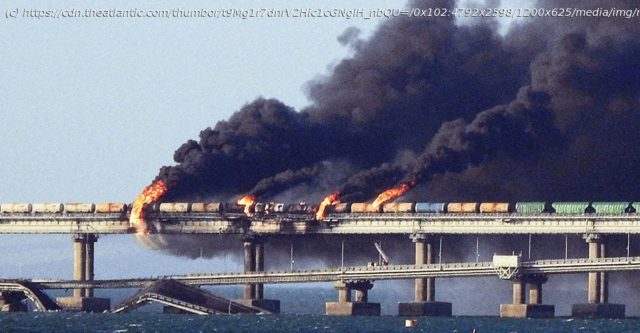The attack on the crucial link between Russia and Crimea matters less for its tactical significance and more for what it says about the course of the war.
On Saturday, the Ukrainians hit the Kerch Strait Bridge, which leads from Russia to Crimea, with something—a missile, explosives planted by naval commandos, a truck laden with explosives. No one who knows is saying for sure. As is the way of military commentary in 2022, experts—real, fake, self-proclaimed—are studying the imagery floating around Twitter and insisting that they know just what happened. Those pictures show a two-lane span dropped into the water, an adjacent pair of lanes still standing, and, on a parallel rail bridge, a train hauling tanker cars that are burning fiercely. The Russians have already run a new train across the rail bridge, but no one knows whether there was anything in it, to serve as a real test of whether the span can still bear the weight of a full load, or whether it was simply intended to create the illusion of normalcy—the creator of Potemkin villages for Catherine the Great was, after all, a Russian general.
The tactical questions of how the Ukrainians pulled off this strike and of whether lasting damage has occurred are interesting and important but currently unresolvable publicly. What can, however, be more profitably discussed is what this tells us about where the Russia-Ukraine war is headed.
“Battles are the principal milestones of secular history,” Winston Churchill wrote in his biography of the Duke of Marlborough. The strike on the Kerch Strait Bridge was not a battle, but it was an important contributor to one of the great inflection points of this war—the moment when Russian elites began to understand that they are losing. The retreat of Russian forces from Kyiv in the early spring could be awkwardly explained as an unreciprocated gesture of goodwill. It did not involve a rout. The Ukrainian counteroffensive that liberated the Kharkiv region was a more difficult-to-swallow “repositioning” accompanied, however, by video images of the surrender and slaughter of retreating troops. Both could be understood as the result of poor decisions by military leaders who could be sacked and replaced.
The Kerch Strait Bridge attack, by contrast, inflicted at most a couple of casualties but packed multiple punches. It struck a prime symbol of the project of Russian imperial restoration, an expensive structure designed to link a Crimea reincorporated into Russia with the motherland. It damaged a crucial supply route. It showed that Ukraine could reach deep behind Russian lines to hit, with exquisite precision, a key and extremely well-defended target. It was, above all, a personal as well as a national humiliation: This was Vladimir Putin’s pet construction project, and it was the most unwelcome gift possible on his 70th birthday.
Russia’s military predicament is going from bad to worse. Occupying a thousand-kilometer front and reliant on massed firepower, the Russian military depends on creaking supply lines that run parallel to the front and that are increasingly vulnerable to Ukrainian precision attacks.






